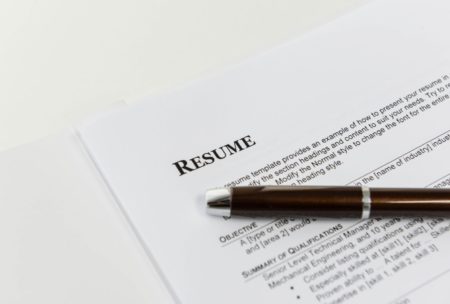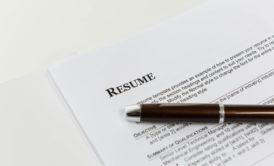1838 students have accelerated their skills with this course
Career Development Courses
Resume & Cover Letter Courses

Filters
Courses to get you started
Discover More In Resume & Cover Letter Courses
Filters
Resume & Cover Letter Courses

Many may think that resume writing courses are unnecessary and do not contribute to one's career development. However, upon studying these courses, you will discover how learning the basics of resume and cover letter building can set you apart from hundreds of other applicants. The costs you incur are nothing but a necessary investment for a more progressive future.
Nowadays, creating a resume is easy, thanks to the fillable formats available on the Internet. Using these tools makes the process fast and convenient, but it is not advisable to rely on them entirely. Applicants should prefer writing from scratch because recruiters from popular recruitment platforms like LinkedIn look for more personalized submissions.
Creating the perfect resume is critical because the current job application success rate only sits at 2-3.4%. Besides knowing what to incorporate in a resume, applicants should also increase their writing skills to impress recruiters. After all, the first stage of the job application process begins with piquing the hiring managers' attention.
Job seekers should prioritize making an impressive resume to have a chance at their dream jobs. Reports show that 68% of candidates who successfully landed jobs in the first 90 days of application submitted professional-looking resumes. Taking a resume writing course or two can be game-changing.
Nowadays, creating a resume is easy, thanks to the fillable formats available on the Internet. Using these tools makes the process fast and convenient, but it is not advisable to rely on them entirely. Applicants should prefer writing from scratch because recruiters from popular recruitment platforms like LinkedIn look for more personalized submissions.
Creating the perfect resume is critical because the current job application success rate only sits at 2-3.4%. Besides knowing what to incorporate in a resume, applicants should also increase their writing skills to impress recruiters. After all, the first stage of the job application process begins with piquing the hiring managers' attention.
Job seekers should prioritize making an impressive resume to have a chance at their dream jobs. Reports show that 68% of candidates who successfully landed jobs in the first 90 days of application submitted professional-looking resumes. Taking a resume writing course or two can be game-changing.
Most commonly asked questions about Resume & Cover Letter Courses
A resume or curriculum vitae is a formal document that an applicant submits to companies and employers to fill a specific job opening. It is also a shortened summary of skills, work experiences, and other assets that make an applicant suitable for the said opening. It can also contain attachments that prove applicants' claim of eligibility and training through certifications.
Writing resumes should be a balance of enthusiasm and professionalism. Your objective statements should be brimming with confidence but not too overpowering. The ultimate purpose of a resume is for the person reading to appreciate your professional background and consider you for the open position.
The resumes you submit are most likely your first contact with a potential employer. Please know that in the professional setting, first impressions last. Also, 24% of hiring managers only allot 30 seconds to read your resume, create an assessment, and decide whether you will go through the next level.
A winning resume resonates clearly with hiring managers. Your words should not only impress but also create an image in the recruiters' heads that you are already working the job they are opening. Completing courses on becoming better resume writers will positively impact future job applications and help unlock other career goals.
Writing resumes should be a balance of enthusiasm and professionalism. Your objective statements should be brimming with confidence but not too overpowering. The ultimate purpose of a resume is for the person reading to appreciate your professional background and consider you for the open position.
The resumes you submit are most likely your first contact with a potential employer. Please know that in the professional setting, first impressions last. Also, 24% of hiring managers only allot 30 seconds to read your resume, create an assessment, and decide whether you will go through the next level.
A winning resume resonates clearly with hiring managers. Your words should not only impress but also create an image in the recruiters' heads that you are already working the job they are opening. Completing courses on becoming better resume writers will positively impact future job applications and help unlock other career goals.
A great resume can favor applicants with fewer and less extensive educational and professional assets. Despite being a newbie, you can still even the playing field by knowing how to write resumes that lead to a successful job search. Apply these expert-recommended tips to keep hiring managers interested and invested in your application:
1. Clear. One of hiring managers' biggest pet peeves is an unruly-looking resume. Think of resumes as a reflection of yourself, so the image people see in your submission says a lot about your character and professionalism. Besides, companies do not have the luxury of time to know you personally before deciding whether you are worthy of proceeding to the interview phase.
2. Concise. Concise resumes are both short and comprehensive. Try to be as detailed as possible but never bombard your submission with too much information that can overwhelm the readers. Instead, pick out the most critical details and present them in the most practical way possible.
3. Personalized. Fillable resumes are easy and fast, but they offer the least chances of getting hired. Hiring managers receive hundreds to thousands of applications, and the ones that stand out the most are those who successfully expressed themselves through their resumes. There is no need to be superfluous, but it is essential to write a resume that shows a glimpse of your most authentic self.
4. Result-oriented. In listing previous experiences, most applicants try to be task-oriented instead of result-oriented. Task-oriented descriptions feature the responsibilities the applicant handled in a prior position, while result-oriented descriptions focus on the changes and developments they contributed while still working at a specific job. Being result-oriented is more effective because you are quantifying your accomplishments and capabilities.
5. Updated. Before sending a resume, always ensure that all the facts listed there are up-to-date. Have a quick but thorough scan of your details and professional assets. Not being able to update critical data in your resume may create an impression that you are disorganized and not invested in the application.
1. Clear. One of hiring managers' biggest pet peeves is an unruly-looking resume. Think of resumes as a reflection of yourself, so the image people see in your submission says a lot about your character and professionalism. Besides, companies do not have the luxury of time to know you personally before deciding whether you are worthy of proceeding to the interview phase.
2. Concise. Concise resumes are both short and comprehensive. Try to be as detailed as possible but never bombard your submission with too much information that can overwhelm the readers. Instead, pick out the most critical details and present them in the most practical way possible.
3. Personalized. Fillable resumes are easy and fast, but they offer the least chances of getting hired. Hiring managers receive hundreds to thousands of applications, and the ones that stand out the most are those who successfully expressed themselves through their resumes. There is no need to be superfluous, but it is essential to write a resume that shows a glimpse of your most authentic self.
4. Result-oriented. In listing previous experiences, most applicants try to be task-oriented instead of result-oriented. Task-oriented descriptions feature the responsibilities the applicant handled in a prior position, while result-oriented descriptions focus on the changes and developments they contributed while still working at a specific job. Being result-oriented is more effective because you are quantifying your accomplishments and capabilities.
5. Updated. Before sending a resume, always ensure that all the facts listed there are up-to-date. Have a quick but thorough scan of your details and professional assets. Not being able to update critical data in your resume may create an impression that you are disorganized and not invested in the application.
An effective resume can become more impactful when sent with an equally effective cover letter. Resumes and cover letters contain information about applicants, but they serve different purposes. While resumes are more career-oriented, cover letters focus on applicants' personal backgrounds.
Here are helpful guidelines when drafting a cover letter for any position:
1. Short. Try to keep your cover letter to a page or two. Having an excessively long cover letter may discourage hiring managers from reading your resume. Remember, you are not writing a journal entry.
2. Specific. Customize cover letters according to the job position you are applying. Doing this will channel your intention more clearly because the details you use are more aligned with a specific work.
3. Professional. Always maintain decorum and tact. Use respectful words and refrain from being too casual in your letter. Although you are talking about yourself, do not forget that you are dealing with a professional situation.
4. Positive. Set a positive tone for your cover letters. Presenting a more forward and brighter tone will help emphasize your excitement for the job. Besides, it works in the applicants' favor because it highlights their strengths and accomplishments.
5. Attention-grabbing. Open your cover letter with an attention-grabbing statement. Since this document is akin to an introduction to your resume, you should already hook the hiring managers from the get go.
Here are helpful guidelines when drafting a cover letter for any position:
1. Short. Try to keep your cover letter to a page or two. Having an excessively long cover letter may discourage hiring managers from reading your resume. Remember, you are not writing a journal entry.
2. Specific. Customize cover letters according to the job position you are applying. Doing this will channel your intention more clearly because the details you use are more aligned with a specific work.
3. Professional. Always maintain decorum and tact. Use respectful words and refrain from being too casual in your letter. Although you are talking about yourself, do not forget that you are dealing with a professional situation.
4. Positive. Set a positive tone for your cover letters. Presenting a more forward and brighter tone will help emphasize your excitement for the job. Besides, it works in the applicants' favor because it highlights their strengths and accomplishments.
5. Attention-grabbing. Open your cover letter with an attention-grabbing statement. Since this document is akin to an introduction to your resume, you should already hook the hiring managers from the get go.
There is no right or wrong way to write a resume. While there are standard resume formats, hiring managers are becoming less stringent as long as the applicants are organized and formal.
If you feel like your resume writing expertise is getting rusty, feel free to follow these pointers in writing a resume:
1. Pick a format. If you feel lost in starting a resume, start by picking a format. There are three standard formats that employers prefer, namely, chronological, functional, and hybrid. Next, determine which among the three works best with your background, the company hosting the job opening, and the position you are applying for.
2. Summarize your personal details. Reserve some space at the top section of your resume for personal details and contact information. Generally, hiring managers would want to see your full name, age, location, email address, and LinkedIn profile. Be sure that these details are easy to see so that recruiters will have an easier time contacting you for the next phase.
3. Organize your academic and professional background. Besides featuring the most recent academic and professional achievements, ensure that these details are relevant to the position you are applying for. It is easier for hiring managers to arrange this information in a reverse chronological order.
4. Insert relevant keywords. Before writing a resume, research the common keywords companies use in their job posts. Using relevant keywords will help create a signal to hiring managers that you match the profile they are looking for.
5. Double check for syntax errors and inconsistencies. After filling in the details and finessing the format, look for grammatical errors and inconsistencies. Do not be complacent because minor mistakes can prompt hiring managers to reject your application outright.
If you feel like your resume writing expertise is getting rusty, feel free to follow these pointers in writing a resume:
1. Pick a format. If you feel lost in starting a resume, start by picking a format. There are three standard formats that employers prefer, namely, chronological, functional, and hybrid. Next, determine which among the three works best with your background, the company hosting the job opening, and the position you are applying for.
2. Summarize your personal details. Reserve some space at the top section of your resume for personal details and contact information. Generally, hiring managers would want to see your full name, age, location, email address, and LinkedIn profile. Be sure that these details are easy to see so that recruiters will have an easier time contacting you for the next phase.
3. Organize your academic and professional background. Besides featuring the most recent academic and professional achievements, ensure that these details are relevant to the position you are applying for. It is easier for hiring managers to arrange this information in a reverse chronological order.
4. Insert relevant keywords. Before writing a resume, research the common keywords companies use in their job posts. Using relevant keywords will help create a signal to hiring managers that you match the profile they are looking for.
5. Double check for syntax errors and inconsistencies. After filling in the details and finessing the format, look for grammatical errors and inconsistencies. Do not be complacent because minor mistakes can prompt hiring managers to reject your application outright.
Writing a cover letter is a challenging and delicate process. High-level business writing skills will be crucial, but one should also communicate with hiring managers on a human level. Like in writing resumes, cover letters should also have a balance.
Here are simplified tips on how to write a magnetizing cover letter:
1. Be courteous. Use appropriate salutations to open your cover letter. This gesture will emphasize your courteousness and set a positive mood for your letter. Starting with a pleasant attitude will help influence hiring managers to accept your initial application and slate you for the interview phase.
2. Express your excitement for the job. Cover letters should highlight how much you want to land the job. After all, hiring managers do not like wasting their time on applicants who will quit halfway through the application process or are half-hearted about the open position. Insert a sentence or two talking about your excitement in the first paragraph.
3. Highlight strengths. Although it is the resume that contains the technical breakdown of your skills and background, you should create a preview of it in the cover letter. Reserve a paragraph summarizing some of your most outstanding work-related achievements to explain how these experiences allow you to perform well in the workspace.
4. Explain why you fit the bill. After discussing your technical prowess, present an assessment of why you are a top contender for the position. It is your chance to highlight your work ethics or how you deal with crises. Create an elevator pitch for yourself that will convince hiring managers that calling you for an interview is a must.
5. Be thankful. As you close the cover letter, express your gratitude for the opportunity to apply for the job opening. Saying thank you will bolster the impression that you are highly interested and excited about the position. Besides, it shows that you are respectful, and they can expect this trait to manifest in the workplace once hired.
Here are simplified tips on how to write a magnetizing cover letter:
1. Be courteous. Use appropriate salutations to open your cover letter. This gesture will emphasize your courteousness and set a positive mood for your letter. Starting with a pleasant attitude will help influence hiring managers to accept your initial application and slate you for the interview phase.
2. Express your excitement for the job. Cover letters should highlight how much you want to land the job. After all, hiring managers do not like wasting their time on applicants who will quit halfway through the application process or are half-hearted about the open position. Insert a sentence or two talking about your excitement in the first paragraph.
3. Highlight strengths. Although it is the resume that contains the technical breakdown of your skills and background, you should create a preview of it in the cover letter. Reserve a paragraph summarizing some of your most outstanding work-related achievements to explain how these experiences allow you to perform well in the workspace.
4. Explain why you fit the bill. After discussing your technical prowess, present an assessment of why you are a top contender for the position. It is your chance to highlight your work ethics or how you deal with crises. Create an elevator pitch for yourself that will convince hiring managers that calling you for an interview is a must.
5. Be thankful. As you close the cover letter, express your gratitude for the opportunity to apply for the job opening. Saying thank you will bolster the impression that you are highly interested and excited about the position. Besides, it shows that you are respectful, and they can expect this trait to manifest in the workplace once hired.
Resume writing courses are specialized academic programs that teach students how to create resumes that will help them land their dream jobs. They heavily contain business writing lessons on resume formats and other considerations that make a job application more polished. They are typically short-term courses that do not involve high-level mental stakes.
These courses are not required for job hiring but can set precursors to a successful job search. It is best for applicants who may not have the most extensive professional experience because an organized resume easily stands out in applications. Experience and skills are essential, but hiring managers cannot appreciate them if the presentation looks too discombobulated.
Regardless of your professional competencies and career goals, resume courses will help you become a better job hunter. You discover new techniques and trends to make your application more attractive to sellers. Most importantly, the lessons will help make your submissions as authentic as possible.
Finding online courses on resume writing is easy, but not all give top-tier value. If you want lessons that satisfy your money's worth and more, check out Skill Success. Our asynchronous video-based programs are created by some of the most successful experts in the industry today.
These courses are not required for job hiring but can set precursors to a successful job search. It is best for applicants who may not have the most extensive professional experience because an organized resume easily stands out in applications. Experience and skills are essential, but hiring managers cannot appreciate them if the presentation looks too discombobulated.
Regardless of your professional competencies and career goals, resume courses will help you become a better job hunter. You discover new techniques and trends to make your application more attractive to sellers. Most importantly, the lessons will help make your submissions as authentic as possible.
Finding online courses on resume writing is easy, but not all give top-tier value. If you want lessons that satisfy your money's worth and more, check out Skill Success. Our asynchronous video-based programs are created by some of the most successful experts in the industry today.
No course is a one-size-fits-all program, especially regarding resume writing. Every job application process is a unique experience, and every position asks for different requirements. All-in-all, what can be considered the "best" course for a learner trying to improve their resume writing skills is finding programs that give them the most value within a reasonable period.
Besides job requirements and other industry-related factors, resumes should also fit the applicants' personalities. A resume may be a formal document, but it should mirror the person writing it. Thus, top-tier resume writing programs should also train applicants to write authentic outputs that connect to hiring managers.
Besides the lessons, learners should also look into the accessibility of the courses they wish to partake in. Nowadays, resume writing programs are all over the World Wide Web. Some of the most organized and student-friendly lessons are found in Skill Success.
Skill Success is an e-learning platform that utilizes video-based courses to teach students various skills and lessons. For example, our resume writing courses have easy-to-follow demonstrations that enable learners to mimic the techniques the instructors show in the videos. Since these videos are pre-recorded, learners can pause and rewind the parts they need more time to master.
Besides job requirements and other industry-related factors, resumes should also fit the applicants' personalities. A resume may be a formal document, but it should mirror the person writing it. Thus, top-tier resume writing programs should also train applicants to write authentic outputs that connect to hiring managers.
Besides the lessons, learners should also look into the accessibility of the courses they wish to partake in. Nowadays, resume writing programs are all over the World Wide Web. Some of the most organized and student-friendly lessons are found in Skill Success.
Skill Success is an e-learning platform that utilizes video-based courses to teach students various skills and lessons. For example, our resume writing courses have easy-to-follow demonstrations that enable learners to mimic the techniques the instructors show in the videos. Since these videos are pre-recorded, learners can pause and rewind the parts they need more time to master.



































